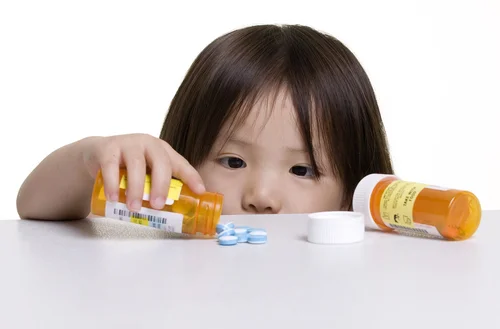The Dirty Truth About Generic Drugs
How many times have you asked your pharmacist if there is a difference between your child’s generic medication and the brand-name? How many times have you been reassured that they’re “exactly the same”–aside from the price difference? According to Katherine Eban of The New York Times—this is blatantly false, misleading—and is putting our children’s health, and our health at risk.
On Mother’s Day, last Sunday, I curled up on the sofa with The New York Times, one boy and two mutts, only to discover that (as usual) my Sunday snuggle was tainted by the painful jab of more bad news. In this case—the news that I’ve been giving my twelve year old son Quinn toxically contaminated pills for nearly every single day of his twelve years on this planet—that is 365 x 12= 4,380 days, during the most vulnerable developmental period of his life.How many times have you asked your pharmacist if there is a difference between your child’s generic medication and the brand-name? How many times have you been reassured that they’re “exactly the same”–aside from the price difference? According to Katherine Eban of The New York Times—this is blatantly false, misleading—and is putting our children’s health, and our health at risk.
If you subtract the last two years in which I partnered with a team of integrative doctors to switch my son to a cleaner thyroid medication (for a whole host of reasons I I’ll explain in a future blog)—and one that combines T3 and T4—Naturethroid*—then the math comes out to be more like 3,650. That does not count all of the random antibiotics given by various pediatricians at various points in his (and his twin brother’s) life for all of the myriad illnesses which they have shared. I’ll bet that I probably bought generic drugs at least fifty percent of the time—trusting in the word of my local pharmacist–and several doctors.
What are we to do when we learn that the “life saving” generic medications we’ve been sold are actually causing our children harm?
I’m going to assume that if you’re reading this you’re raising a small person—and therefore, you’ve barely got time to wipe your nose before it’s time to pick up your little person from school or attend to their next soccer game.
The highlights (or lowlights) are as follows: Journalist Katherine Eben traversed multiple continents over the course of ten years interviewing over 240 people in the course of researching her new book Bottle of Lies. She learned that generic drugs are made outside of the US in factories that are not policed as carefully as brand-name drugs made in the US. Worse—many FDA inspectors have been found to accept bribes or knowingly participate in the cover up of these fraudulent claims to purity.
The FDA policy of allowing “scheduled inspections” enables the manufacturing plants to cover up toxic accidents, contaminated drugs, and then create false data. One honest inspector named Peter Baker exposed a huge amount of fraud over a five year course in India and China where he “uncovered fraud or deceptive practices in almost four-fifths of the drug plants he inspected. Some plants used hidden laboratories, secretly repeated tests and altered results to produce fake data that fundamentally misrepresented drug quality, then submitted that data to the regulators [from the FDA],” writes Eben.
According to Eben, these deceptions led to drugs with “toxic impurities, unapproved ingredients and dangerous particulates reaching American patients. Some doctors have struggled to stabilize patients who became sicker after they were switched from a brand-name to a generic, or between generic versions.”
And hold onto your diaper bag folks—the culmulation of Eben’s revelation is that, “At the vast majority of the unannounced inspections, the investigators found things the plants no longer had time to fix: Infestations of birds and insects. A pile of critical manufacturing records, tossed in a trash bin. An employee bathroom near a sterile manufacturing area in one plant lacked drainage piping, so urine puddled directly onto the floor.”
For a short while, Mr. Baker’s discoveries led to improvements. Certain plants’ contracts were cancelled. But tragically, in July 2015, the FDA reversed the very solution by Mr. Baker that had led to all these discoveries—surprise inspections. The FDA downgraded the regulatory sanctions against more than 100 Indian plants (planned inspections which allow for cover ups, fraud and bribery). Mr. Baker eventually quit—and according to Eben, “This allowed drugs from those plants to continue to reach patients in the United States.”
What is a parent to do?
You can ask your pediatrician to write your child’s prescription for the brand name only.
It will probably cost more–but if your doctor demands it, your insurance may cover it.
Your insurance may ask to see your child’s medical records to prove that your child’s health condition was impacted by a change in meds.
Your doctor may need to write a letter to show that your child has had some negative reactions to the brand name, or to prove that they are allergic to the brand name–or that it is not working as effectively.
If they still refuse to cover it, curse a few times, feel your feelings–and then pick up the phone and file an appeal.
If you have the financial ability and you want peace of mind—you can order brand name meds on your own dime from a Canada online pharmacy, which gets the medications from brand name distributors for cheaper than you could buy in the US. Warning: it’s not cheap and it can take several weeks to deliver but the prices are better than they would be in the US. One pharmacy our pediatrician trusts is Canada Pharmacy.
Take yourself to yoga, make a cup of tea, or go to your healing space to get some deep breaths in.
Start a Change.org petition or find one that’s in progress!
Call or write your local congress-person.
Vote in the next election for the candidate who has a concrete plan to support and improve upon the Affordable Care Act.
Then take a look at your child or children, acknowledge the ways in which they are doing well–be grateful for these–even if they are tiny.
What are you going to do?
What action steps you have taken that have have helped support your child in getting the brand name medicine he/she needs?
*Note: Naturethroid is a bio-identical hormone which the Endocrinologists of America do not recognize as being a viable treatment for Hypothyroidism. Many highly respected functional medicine doctors disagree. I will be writing a follow up blog on this topic in more detail in the weeks to come. If you want more information contact me!







